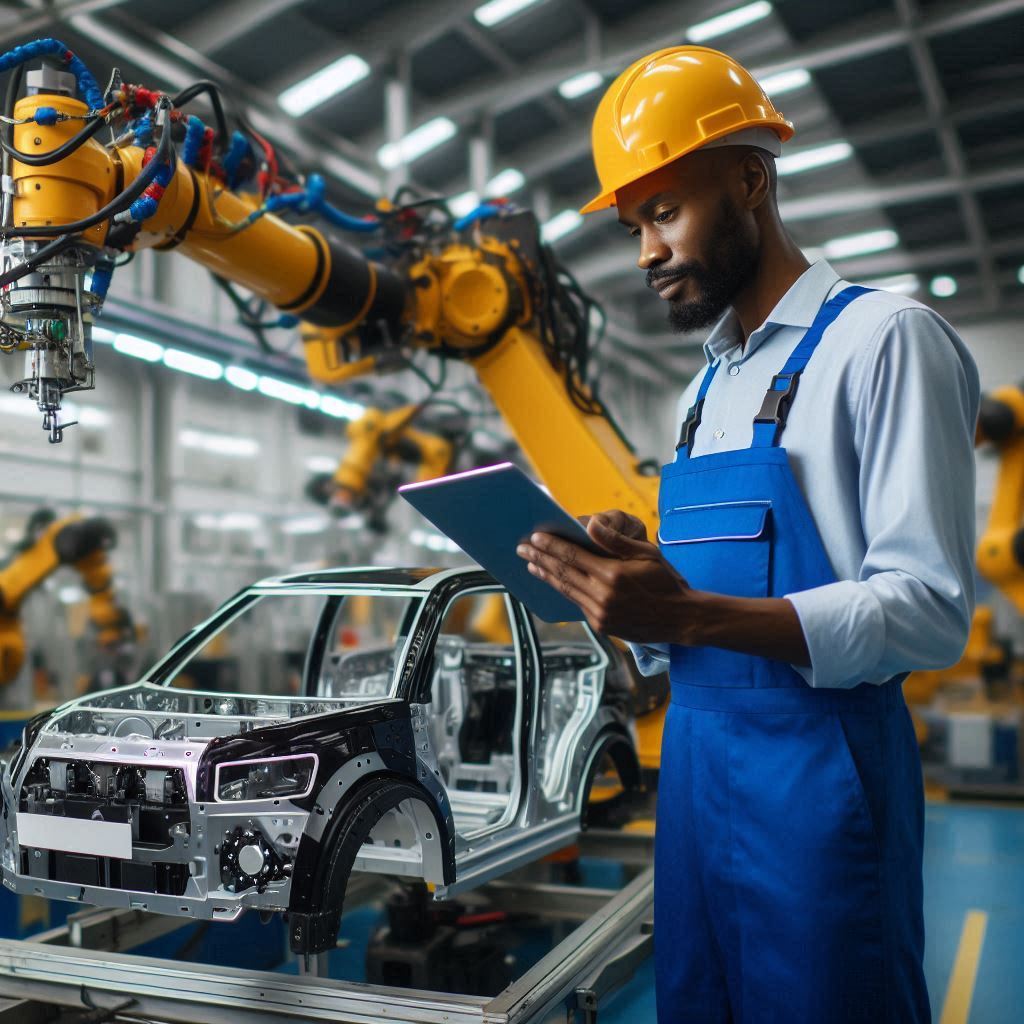Introduction
Overview of urban challenges in Africa
Let’s explore the Urban Challenges with Smart Tech.
Africa faces significant urban challenges today.
Rapid population growth strains infrastructure and resources.
Cities struggle with inadequate housing, poor sanitation, and unemployment.
Traffic congestion and pollution severely impact health and quality of life.
Informal settlements often lack basic services, pushing many into poverty.
These pressing issues require innovative solutions and collaborative efforts.
Importance of sustainable development in urban settings
Sustainable development is crucial for Africa’s urban future.
It promotes economic growth while protecting the environment.
Sustainable practices contribute to enhanced living standards for urban populations.
They ensure that future generations inherit thriving, resilient cities.
Policymakers must prioritize sustainability to create inclusive urban spaces.
A focus on sustainability also fosters community engagement and empowerment.
Introduction to AI as a solution for social good
This post explores how AI can address urban issues in Africa.
We will discuss specific applications of AI technology in urban planning.
Next, we will highlight successful case studies demonstrating AI’s impact.
Lastly, we will examine potential challenges and ethical considerations.
Join us as we delve into the future of sustainable urban development shaped by AI.
The Urbanization Challenge in Africa
Statistics on Urban Growth in Africa
Africa is experiencing rapid urbanization, with cities growing at an unprecedented rate.
According to the United Nations, Africa’s urban population is expected to double by 2050.
In 1990, only 29% of Africa’s population lived in urban areas.
By 2020, this statistic rose to approximately 43%.
- Over 60% of Africa’s population is projected to be urban by 2050.
- The continent is home to 16 of the 20 fastest-growing cities in the world.
- Cities such as Lagos, Nairobi, and Addis Ababa are expanding dramatically.
This rapid urbanization brings both opportunities and challenges.
It can drive economic growth and innovation.
However, it also strains existing infrastructure and resources.
Common Urban Challenges: Housing, Transportation, Health, and Waste Management
The rapid growth of urban populations in Africa contributes to multiple challenges that cities struggle to address.
Key issues include
Housing
In many African cities, affordable housing remains scarce.
The World Bank reports that over 50% of urban dwellers live in informal settlements or slums.
This leads to overcrowding and inadequate living conditions.
- Limited housing supply fails to meet demand.
- Poor access to essential services like water and electricity exacerbates living conditions.
Transportation
Urban transportation systems often cannot keep pace with population growth.
Traffic congestion becomes common, leading to long commute times.
- Many cities lack reliable public transportation options.
- Road conditions deteriorate as traffic increases.
Health
Urban health challenges are significant, especially in slums.
High population densities contribute to the spread of diseases.
- Limited healthcare facilities struggle to serve large populations.
- Air pollution from traffic affects respiratory health.
Waste Management
Garbage disposal issues plague many cities.
Inadequate waste management systems lead to pollution and environmental degradation.
We Design & Develop Websites, Android & iOS Apps
Looking to transform your digital presence? We specialize in creating stunning websites and powerful mobile apps for Android and iOS. Let us bring your vision to life with innovative, tailored solutions!
Get Started Today- Cities often experience waste accumulation due to poor infrastructure.
- Contaminated environments can cause health problems for residents.
Each of these challenges requires immediate and effective solutions.
Addressing them is crucial for the health and well-being of urban populations.
The Impact of These Challenges on Communities and Economies
The repercussions of these urban challenges resonate throughout communities and economic systems.
The effects are often interlinked, creating a cycle of struggle for urban populations.
Economic Impact
Poor urban planning affects economic growth.
Inefficient transportation systems hinder commerce and access to jobs.
- Businesses face delays due to traffic congestion.
- Limited infrastructure raises the cost of doing business.
Social Impact
Urban challenges foster social inequality.
Those living in informal settlements lack access to essential services.
- Education and healthcare remain inaccessible to low-income families.
- Marginalized communities often experience higher crime rates.
Environmental Impact
Ineffective waste management harms the environment.
Pollution can lead to public health crises, placing further burden on urban areas.
- Contaminated water sources can lead to disease outbreaks.
- Loss of green spaces reduces biodiversity and affects climate resilience.
Addressing urban challenges in Africa requires innovative solutions.
AI-driven technologies can play a critical role in transforming urban experiences for communities and city officials alike.
Basically, Africa’s urbanization presents a complex array of challenges that need urgent attention.
The rapid urban growth places significant pressure on housing, transportation, health, and waste management systems.
The implications of these challenges extend beyond the urban landscape, affecting economic performance and social stability.
To create sustainable urban environments, leveraging AI and smart technology for social good is imperative.
Understanding these intricacies allows for a comprehensive approach to tackling Africa’s urban challenges effectively.
Collaboration among governments, businesses, and communities is essential to build resilient cities that can thrive in the face of urbanization.
Read: How Robotics is Revolutionizing Manufacturing in Africa
What is AI and How Can It Help?
Definition of AI and its capabilities
Artificial Intelligence (AI) refers to the simulation of human intelligence in machines.
These machines are programmed to think and learn like humans.
AI can process vast amounts of data rapidly.
It can identify patterns and make decisions based on that data.
The technology has the ability to understand natural language and interact with human users effectively.
AI systems can also adapt and improve their performance over time.
This capability allows for continuous enhancement of services and user experience.
Various AI technologies relevant to urban living
Several AI technologies are especially relevant to urban living.
These technologies can transform how cities operate, making them smarter and more efficient.
Below, we explore some of these technologies:
- Machine Learning: This subset of AI enables systems to learn from data. It improves accuracy over time without being explicitly programmed.
- Predictive Analytics: This technology analyzes current and historical data. It predicts future outcomes, allowing for proactive decision-making.
- Natural Language Processing (NLP): NLP allows machines to understand and respond to human language. This makes communication between residents and urban services seamless.
- Computer Vision: AI equips systems with the ability to interpret images and videos. Urban planners use this technology for monitoring traffic and public safety.
- Internet of Things (IoT): IoT incorporates AI into devices connected online. It collects data to enhance urban infrastructure and services.
- Robotic Process Automation (RPA): RPA uses AI to automate routine tasks. This increases efficiency in city management and administration.
Examples of how AI has been used successfully in other regions
AI is transforming cities worldwide, addressing urban challenges and improving living conditions.
Here are some notable examples:
- Smart Traffic Management in Los Angeles: AI-driven traffic systems analyze real-time data to optimize signal timing, reducing congestion and enhancing travel times.
- Waste Management in Seoul: Seoul’s smart waste system uses AI to monitor bin levels, optimizing collection routes based on demand.
- Public Safety in London: London uses AI in predictive policing, analyzing crime trends to deploy resources effectively.
- Healthcare in New York: AI in healthcare predicts patient admissions and identifies high-risk individuals, enabling preventive care.
- Energy Efficiency in Singapore: AI tracks energy use patterns, suggesting optimization tips for residents and businesses.
- Water Management in Cape Town: During a drought, Cape Town used AI to optimize water distribution, employing predictive analytics.
These cases highlight AI’s potential for effective urban solutions.
African cities, facing rapid population growth and infrastructure challenges, can adopt similar innovations.
AI can address unique regional needs, fostering resilient, sustainable cities.
Successful implementation requires understanding each city’s unique dynamics.
We Design & Develop Websites, Android & iOS Apps
Looking to transform your digital presence? We specialize in creating stunning websites and powerful mobile apps for Android and iOS. Let us bring your vision to life with innovative, tailored solutions!
Get Started TodayLocal engagement and stakeholder collaboration are crucial for building effective AI frameworks tailored to local contexts.
Ethical considerations—such as data privacy and transparency—must guide AI deployment, ensuring public trust.
Several African cities, including Nairobi and Accra, are already adopting AI solutions.
Startups are also emerging, focusing on local challenges and social impact.
Through public-private partnerships and collaborative strategies, AI can transform urban areas in Africa, creating thriving, resilient cities.
Significantly improve urban living in Africa, paving the way for a brighter future.
Read: African Digital Payment Systems: Revolutionizing Financial Inclusion
AI Innovations Addressing Housing Issues
Smart City Initiatives Focusing on Affordable Housing
Urban areas in Africa face severe housing shortages.
Rapid population growth exacerbates this issue.
Many governments and organizations are now exploring smart city initiatives.
These initiatives employ AI technologies to enhance housing solutions.
Smart cities use data-driven approaches to improve urban living conditions.
They focus on sustainable development, efficient resource management, and affordability.
Here are several influential ways smart city initiatives tackle these challenges:
- Data Collection for Housing Needs: Smart cities utilize IoT devices to gather data on housing demands. They analyze population trends, income levels, and demographic factors.
- Predictive Analytics: AI algorithms analyze historical data to predict future housing needs. This helps city planners allocate resources efficiently.
- Dynamic Pricing Models: AI can optimize pricing strategies for affordable housing. This ensures housing remains accessible to low-income families.
- Community Engagement: AI-driven platforms facilitate community consultations. Citizens highlight their needs and preferences regarding housing.
By leveraging these innovations, smart city initiatives create strategies that meet housing demands effectively.
They also promote inclusive urban growth.
Role of AI in Urban Planning and Real Estate Development
AI technologies revolutionize urban planning and real estate development in Africa.
They offer tools that optimize design, minimize costs, and enhance functionality.
Here are some significant roles AI plays in these areas:
- Site Selection: AI models evaluate potential sites using geographic information systems (GIS). They consider factors like infrastructure, accessibility, and environmental impact.
- Design Optimization: AI uses parametric design principles to create efficient building designs. This reduces material usage and costs while maximizing space.
- Risk Assessment: AI helps analyze data related to natural disasters. This ensures that new developments are resilient to adverse events.
- Construction Management: AI streamlines construction processes. It enhances scheduling, resource allocation, and project management.
- Smart Infrastructure: AI integrates smart technologies into housing projects. This supports energy efficiency, waste management, and water conservation.
These roles highlight AI’s importance in shaping urban environments.
They enable cities to use resources wisely while providing quality housing.
Case Studies of Successful AI Implementations in Housing
Across Africa, cities are successfully using AI to tackle housing challenges. Here are some standout projects:
- Nairobi, Kenya: Nairobi City County uses AI in urban planning, analyzing housing data with machine learning. This approach identifies optimal locations for affordable housing and integrates community feedback, building trust.
- Lagos, Nigeria: Lagos State employs AI to streamline housing approvals, with real-time assessments reducing delays and boosting transparency in real estate transactions.
- Accra, Ghana: Accra’s AI platform monitors informal settlements, identifying areas needing urgent housing interventions. City planners use this data to allocate resources and improve living conditions.
- Cape Town, South Africa: Cape Town uses predictive analytics in public housing projects, allowing the city to anticipate future housing needs and plan resources effectively.
- Dar es Salaam, Tanzania: Dar es Salaam applies AI for environmental assessments in housing developments. AI-driven simulations predict ecological impacts, promoting sustainable housing practices.
These cases highlight AI’s transformative impact on housing, helping cities make data-driven, informed decisions.
AI innovations reshape how African cities address housing issues, creating sustainable and inclusive solutions.
As urban populations grow, the need for adequate housing intensifies.
By leveraging AI, cities can ensure affordable, livable spaces for all residents.
Ongoing research and development promise further advancements.
Collaboration among tech companies, governments, and communities will drive these changes.
AI will shape the future of housing in Africa, providing better living conditions through smart planning and sustainable practices.by smart technologies prioritizing inclusivity and sustainability.
Read: The Role of Tech Incubators in Nurturing Africa’s Next Unicorns

Enhanced Transportation Solutions through AI
Overview of Urban Transportation Challenges in Africa
Africa faces numerous challenges in urban transportation.
Rapid urbanization strains existing infrastructure.
Many cities are experiencing significant population growth.
This rapid growth often outpaces the development of necessary transport systems.
As a result, cities confront severe traffic congestion.
We Design & Develop Websites, Android & iOS Apps
Looking to transform your digital presence? We specialize in creating stunning websites and powerful mobile apps for Android and iOS. Let us bring your vision to life with innovative, tailored solutions!
Get Started TodayAdditionally, many African countries still rely heavily on informal transport systems.
These systems include minibuses, motorcycle taxis, and shared vehicles.
Such systems often lack regulation, leading to unsafe conditions.
Moreover, public transportation is frequently underfunded and poorly maintained.
Environmental concerns also add to the complexity of transportation in urban areas.
Air pollution from vehicle emissions poses a significant health risk.
Traffic-related accidents are another pressing issue.
Urban mobility is not just about moving people; it’s about enhancing quality of life.
Here are some key challenges:
- Inadequate infrastructure
- Traffic congestion
- Lack of regulation in informal transport
- High accident rates
- Environmental pollution
AI-Driven Traffic Management Systems
AI-driven traffic management systems present promising solutions.
These systems harness real-time data to streamline urban mobility.
Implementing AI helps cities forecast traffic patterns, optimize signal timings, and reduce congestion.
AI algorithms analyze data collected from various sources such as sensors and cameras.
One application is adaptive traffic signal control.
This technology allows traffic lights to change based on real-time conditions.
It reduces waiting times and minimizes stop-and-go traffic.
Cities can also utilize AI to improve public transport schedules.
By analyzing traveler patterns, buses and trains can operate more efficiently.
Moreover, AI can enhance incident detection and response times.
Machine learning models process video feeds from traffic cameras.
These models identify accidents and send notifications to emergency services instantly.
By reacting quickly, they can significantly reduce the severity of incidents.
Additionally, AI aids in demand forecasting.
Cities can better manage public transport fleets by predicting peak usage times.
This proactive approach guarantees that sufficient services are available during busy periods.
As a result, passengers can experience fewer delays and overcrowding.
Here are some benefits of AI-driven traffic management:
- Reduced congestion through optimized routing
- Lower accident rates with faster response times
- Improved public transport efficiency
- Enhanced passenger satisfaction
- Lower carbon footprints with reduced vehicle idling
Case Examples of Ride-Sharing and Public Transportation Optimization
Ride-sharing platforms are transforming transportation dynamics in Africa.
Companies like Uber, Bolt, and Lyft have made significant impacts.
These services complement existing public transport options.
They provide flexible alternatives for urban commuters.
Users can book rides conveniently through mobile applications.
In cities like Lagos, ride-sharing has grown rapidly.
The technology enables carpooling, reducing the number of vehicles on the road.
This approach not only alleviates congestion but also decreases emissions.
We Design & Develop Websites, Android & iOS Apps
Looking to transform your digital presence? We specialize in creating stunning websites and powerful mobile apps for Android and iOS. Let us bring your vision to life with innovative, tailored solutions!
Get Started TodayFurthermore, ride-sharing offers economic opportunities.
Many drivers can generate income while managing their own schedules.
Another noteworthy example is the use of AI in optimizing public transport.
For instance, artificial intelligence is employed in cities like Nairobi.
Here, AI tools analyze passenger data to enhance bus routes and schedules.
The data-driven approach allows for more efficient service delivery.
Mobile apps that provide real-time updates have also emerged.
Such apps keep commuters informed about bus and train schedules.
Passengers can anticipate waiting times better and plan their travel accordingly.
With improved access to information, commuter confidence grows.
In addition, partnerships between tech companies and local governments facilitate innovation.
Many cities have begun to embrace smart mobility initiatives.
These partnerships deploy AI to develop integrated transport systems.
Key features of these initiatives include:
- Data sharing between agencies and private companies
- Coordinated transport schedules
- Real-time tracking of public vehicles
- Payment integration for seamless user experiences
- Increased accessibility for all user demographics
Lastly, AI is a powerful tool for addressing urban transportation challenges in Africa.
By implementing AI-driven traffic management systems, cities can optimize movement.
Such systems enhance safety, improve efficiency, and reduce environmental impacts.
Additionally, ride-sharing platforms contribute to urban mobility solutions by offering flexible alternatives.
Ultimately, these technological advancements hold great promise for creating smarter, more sustainable cities across Africa.
Read: African Renewable Energy Startups: Driving the Green Tech Movement
Healthcare Improvements via AI
AI’s Potential in Improving Public Health Outcomes
Artificial Intelligence (AI) offers transformative potential for healthcare in Africa.
The continent faces numerous health challenges.
Disease outbreaks, limited resources, and inadequate facilities hinder effective healthcare delivery.
AI can bridge this gap by enhancing efficiency, accessibility, and accuracy.
AI-driven technologies can analyze vast amounts of health data quickly.
These analyses identify disease patterns and predict outbreaks.
For instance, machine learning algorithms detect early signs of epidemics through data from hospitals and clinics.
This capability helps health organizations allocate resources more effectively.
Another significant benefit of AI is its ability to personalize patient care.
AI systems can analyze individual health data and recommend tailored treatment options.
Personalized care improves patient outcomes and enhances health management.
AI also facilitates better decision-making for healthcare providers.
With real-time data analysis, doctors can make informed choices quickly.
This improvement is crucial in emergency situations where timely interventions save lives.
Moreover, AI can streamline administrative tasks.
We Design & Develop Websites, Android & iOS Apps
Looking to transform your digital presence? We specialize in creating stunning websites and powerful mobile apps for Android and iOS. Let us bring your vision to life with innovative, tailored solutions!
Get Started TodayBy automating billing, scheduling, and patient management, healthcare professionals can focus more on patient care.
This shift improves the overall efficiency of healthcare systems in African cities.
Applications Like Telemedicine and Predictive Health Analytics
Telemedicine is one of the most impactful applications of AI in healthcare.
It enables remote consultations between doctors and patients.
This approach increases access to healthcare for people in rural and underserved areas.
Using mobile devices, patients can connect with healthcare providers from their homes.
This convenience reduces travel costs and waiting times for patients.
Telemedicine also allows doctors to monitor chronic conditions effectively.
Predictive health analytics plays a crucial role in preventive healthcare.
By analyzing historical health data, AI can predict individual health risks.
This predictive capability enables proactive interventions, which greatly improve health outcomes.
Predictive analytics also assists in resource allocation.
Hospitals can predict patient inflow based on trends, optimizing staff deployment accordingly.
This practice ensures that healthcare facilities remain prepared for surges in patient numbers.
Applications like mobile health (mHealth) campaigns leverage AI to disseminate health information.
They reach large populations effectively, providing essential information about disease prevention and health practices.
Success Stories from Health Tech Initiatives in African Cities
African cities have witnessed remarkable health tech initiatives that utilize AI effectively.
These success stories demonstrate the potential of smart technology in addressing healthcare challenges.
In Kenya, the “Daba” mobile application connects patients with healthcare providers instantly.
This platform reduces the burden on health facilities by facilitating remote consultations.
Patients can receive timely medical advice and prescriptions without physical visits.
In South Africa, “HealthQ” uses AI to analyze patient data for chronic disease management.
Its predictive algorithms enable early intervention, reducing hospitalization rates.
This success underscores the importance of AI in enhancing chronic care schemes.
Another notable initiative is “eHealth Africa,” which focuses on improving health systems through data.
This organization leverages AI to track disease outbreaks and implement timely responses.
Their efforts resulted in improved health outcomes across various regions.
Nigeria’s “Baobab Circle” utilizes AI for managing chronic conditions like diabetes and hypertension.
The app provides personalized support, empowering patients to manage their health actively.
This initiative illustrates how technology can enhance patient engagement and self-management.
Additionally, in Ghana, the “Daba” app utilizes AI to streamline blood donation tracking.
This solution enhances blood safety and availability.
Through crowdsourced data, hospitals can maintain adequate blood supplies more efficiently.
These case studies reveal a common theme: AI enhances healthcare delivery.
Each initiative showcases how technology transforms healthcare systems in different African cities.
We Design & Develop Websites, Android & iOS Apps
Looking to transform your digital presence? We specialize in creating stunning websites and powerful mobile apps for Android and iOS. Let us bring your vision to life with innovative, tailored solutions!
Get Started TodayThese successes inspire further investment in AI-driven health solutions.
Moreover, collaborations between local governments, healthcare providers, and tech companies have bolstered these initiatives.
Partnerships improve capacity building, ensuring sustainability of health tech projects in the long run.
AI in healthcare is a crucial step towards achieving Universal Health Coverage (UHC).
As African cities continue to grow, these technologies will be essential.
By addressing healthcare access and quality, AI paves the way for healthier populations.
Waste Management and Environmental Sustainability
The Growing Waste Crisis in Urban Areas
Urban areas in Africa face an escalating waste crisis.
Rapid urbanization exacerbates this problem, leading to increased waste generation.
Cities struggle with inadequate infrastructure to manage this growing waste effectively.
According to the World Bank, waste generation in Africa will rise significantly as populations grow.
Many cities see a rise in single-use plastics and non-biodegradable materials.
These materials contribute heavily to pollution and threaten ecosystems.
Poor waste management systems create health risks for urban populations.
Uncollected waste attracts pests and spreads diseases.
Communities bear the burden of unsightly garbage and foul odors.
Additionally, improper disposal of hazardous waste poses severe health issues.
The lack of recycling facilities and awareness further complicates the scenario.
Urban dwellers often lack access to reliable waste disposal services.
In many instances, informal waste pickers handle recycling but face numerous challenges.
Recognition and support for these individuals are crucial.
Local governments need to address waste management proactively.
Allocating resources toward effective waste disposal is essential.
Citizens also play an important role in responsible waste management.
Educating communities about sustainable practices can lead to significant improvements.
AI’s Role in Monitoring, Managing, and Reducing Waste
Artificial Intelligence (AI) presents transformative solutions for waste management in Africa.
Cities can harness AI technologies to streamline waste collection and disposal.
Several innovative applications show promise in tackling these challenges.
- Smart Waste Bin Technologies: AI-powered smart bins can optimize collection schedules. These bins monitor waste levels and communicate with collection services. They reduce unnecessary trips, saving fuel and time.
- Waste Sorting and Recycling: AI algorithms can enhance waste sorting processes. They can identify recyclable materials swiftly and accurately. This increases the efficiency of recycling initiatives and encourages sustainable practices.
- Data Analytics for Waste Management: Data-driven insights from AI can inform waste management strategies. Local authorities can analyze data to identify patterns in waste generation.
This enables tailored solutions that meet specific community needs. - Predictive Maintenance: AI can predict when waste management equipment requires maintenance. This proactive approach minimizes downtime and increases operational efficiency.
Cities can enhance their services through timely maintenance. - Public Awareness Campaigns: AI can help optimize campaigns that promote waste reduction. By analyzing social media trends and community engagement, cities can design targeted programs.
These initiatives raise awareness about the importance of waste management. - Illegal Dumping Detection: AI can assist in detecting illegal dumping sites. Surveillance cameras equipped with AI algorithms can identify unauthorized waste disposal.
Authorities can respond promptly to mitigate environmental damage.
By integrating AI into waste management systems, urban areas can make substantial progress.
AI facilitates more efficient operations and empowers communities.
The collaboration between government, technology firms, and local citizens is vital.
Innovative Solutions and Partnerships Focusing on Sustainable Practices
Cities need innovative, sustainable waste management solutions involving multiple stakeholders. Here are some effective approaches:
- Public-Private Partnerships (PPPs): Governments can partner with private companies to boost waste management through technology and infrastructure investments. The private sector brings innovation and expertise.
- Community Engagement Programs: Educating communities on waste reduction and recycling fosters ownership. Knowledgeable residents participate actively in sustainable practices.
- Mobile Waste Management Apps: Mobile apps connect citizens to waste services, offering real-time collection schedules and reporting tools for issues like overflowing bins.
- Incentive Programs for Recycling: Cities can encourage recycling by offering rewards to residents. Recognizing sustainable behaviors motivates broader participation.
- Collaborations with NGOs: NGOs bring insights and community networks to waste management efforts, helping educate and mobilize communities for improved practices.
- Waste-to-Energy Innovations: Transforming waste into energy reduces landfill usage and generates power. Technologies like anaerobic digestion and incineration support cleaner cities.
- Local Businesses as Recycling Hubs: Empowering local shops as recycling points makes recycling accessible, reduces transport costs, and increases recycling rates.
- Learning from Global Best Practices: African cities can adapt models from cities like Curitiba, Brazil, and Seoul, South Korea, to improve waste management.
Strategic waste management is essential for sustainable urban living. AI can enhance efficiency in waste handling, benefiting environmental health.
However, collaboration among communities, government, and businesses remains vital. Together, these stakeholders can drive innovation, creating cleaner, greener cities across Africa.
Challenges and Considerations for AI Implementation
Ethical Concerns Regarding Data Privacy and Surveillance
AI technologies collect vast amounts of data. This data often includes sensitive personal information.
Privacy concerns arise when this information gets misused.
We Design & Develop Websites, Android & iOS Apps
Looking to transform your digital presence? We specialize in creating stunning websites and powerful mobile apps for Android and iOS. Let us bring your vision to life with innovative, tailored solutions!
Get Started TodayTo address these concerns, several key aspects must be considered:
- Data Consent: Users must provide informed consent before their data gets collected.
- Data Security: Implementing robust cybersecurity measures protects personal information.
- Transparency: Organizations should openly share how they use collected data.
- Accountability: Stakeholders must establish accountability systems for any misuse.
- Regulatory Compliance: AI solutions must adhere to local and international data protection laws.
These aspects ensure ethical AI use, while fostering trust and confidence among users.
Striking the right balance between data usage and privacy is crucial.
It is essential to remember that citizens deserve protection from surveillance and exploitation.
Clear policies and transparent practices can mitigate fears surrounding AI technologies.
Ethical guidelines will help navigate the complex data landscape.
The Digital Divide and Ensuring Equal Access to Tech Solutions
The digital divide poses a significant challenge for AI implementation in Africa.
Many urban areas experience disparities in internet access and technology availability.
This gap can hinder the effectiveness of AI solutions. Addressing this issue requires targeted efforts, including:
- Infrastructure Development: Investment in reliable internet access is essential for all urban residents.
- Education and Training: Providing technological literacy ensures that communities can effectively use AI tools.
- Affordable Devices: Making smartphones and computers affordable promotes wider access to technology.
- Partnerships with Local Governments: Collaborating with governments can boost infrastructure and service delivery.
- Community Engagement: Understanding community needs will shape technology implementation effectively.
Efforts to bridge the digital divide promote inclusivity in AI projects.
Equal access to technology opens doors for innovation and economic growth.
Urban governance can only improve when every citizen participates.
Digital equality will empower underserved communities to engage with AI solutions.
Potential Barriers to AI Adoption in Urban Governance
Despite its promise, AI adoption in urban governance faces several challenges. Addressing these barriers is essential for successful implementation.
Here are some common hurdles:
- Lack of Infrastructure: Insufficient technological infrastructure hinders effective AI deployment in many cities.
- Resistance to Change: Bureaucracies may resist new technologies due to concerns about disruption and job security.
- Resource Constraints: Limited budgets often restrict AI development and deployment efforts.
- Skill Shortages: A lack of trained professionals limits the capacity to implement AI systems effectively.
- Public Trust Issues: Mistrust in authorities can lead communities to reject AI solutions.
To overcome these barriers, cities must take strategic steps:
- Encourage Open Dialogue: Authorities should communicate openly about AI’s goals, addressing public concerns and promoting transparency.
- Form Public-Private Partnerships: Collaborations with private businesses can bring innovative solutions and share resources.
- Invest in Training Programs: Developing AI skills in the workforce ensures a pool of professionals equipped to tackle urban challenges.
- Engage Stakeholders: Involving all stakeholders in the process builds support and reduces resistance.
- Develop Ethical Frameworks: Protecting data privacy and ensuring equitable access are essential for AI’s responsible use.
Local governments should prioritize transparency, collaboration, and public engagement to create a supportive environment for AI.
Addressing these barriers paves the way for transformative urban governance, ensuring AI-driven solutions benefit all.
With a strategic approach, cities can leverage AI to address pressing urban issues effectively.
Conclusion
Recap of AI’s Transformative Potential for Urban Challenges in Africa
AI possesses immense capabilities to address urban challenges in Africa.
It can enhance transportation systems, making them more efficient and reliable.
Smart applications can optimize traffic flow and reduce congestion in crowded cities.
By analyzing big data, AI can improve public services, such as waste management and water supply.
Furthermore, AI-driven solutions can promote better urban planning by identifying areas in need of development.
With its predictive analytics, AI can anticipate issues before they escalate, fostering proactive approaches to urban management.
Call to Action for Stakeholders in Government, Tech, and Community Sectors
All stakeholders need to collaborate for AI to succeed in urban environments.
Governments must create supportive policies that encourage innovation and investment in smart technologies.
Tech companies should focus on developing scalable solutions tailored to the unique challenges of African cities.
Additionally, community involvement is crucial for understanding local needs and ensuring inclusive development.
By engaging local populations in the design and implementation of AI projects, we enhance effectiveness and foster trust.
Discussion on the Future of AI for Social Good in African Urban Environments
The future of AI in Africa’s urban landscapes is promising yet requires careful steering.
As technology evolves, so will the potential for smarter, more sustainable cities.
Continued investment in AI research will yield new solutions for pressing urban challenges.
Education and training programs must also emerge to equip the workforce for this transition.
Furthermore, ethical considerations surrounding AI implementation must be prioritized.
We Design & Develop Websites, Android & iOS Apps
Looking to transform your digital presence? We specialize in creating stunning websites and powerful mobile apps for Android and iOS. Let us bring your vision to life with innovative, tailored solutions!
Get Started TodayWe must ensure that AI benefits all citizens equitably, promoting long-term social good.
By uniting efforts across sectors, we can harness AI’s power for urban transformation in Africa.
The opportunity to create resilient, vibrant cities awaits us, but only with dedication and collaboration.
Before You Go…
Hey, thank you for reading this blog post to the end. I hope it was helpful. Let me tell you a little bit about Nicholas Idoko Technologies.
We help businesses and companies build an online presence by developing web, mobile, desktop, and blockchain applications.
We also help aspiring software developers and programmers learn the skills they need to have a successful career.
Take your first step to becoming a programming expert by joining our Learn To Code academy today!
Be sure to contact us if you need more information or have any questions! We are readily available.
Put Your Tech Company on the Map!
Get featured on Nicholas Idoko’s Blog for just $200. Showcase your business, boost credibility, and reach a growing audience eager for tech solutions.
Publish Now










